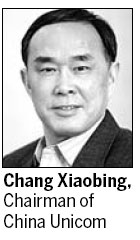China United Network Communications Group Co Ltd, or China Unicom, the parent company of the country's second-biggest mobile carrier by subscriber number, is going through a critical transformation as it tries to concentrate more on its data business, according to its chairman.

Chang Xiaobing said weak domestic demand is putting older mobile services, such as those related to voice and text-messaging, under greater pressure. At the same time, the business value of data services, boosted by smartphone users, is increasing quickly.
"China Unicom has come to a point where it has to transform itself," Chang said in an exclusive interview with China Daily. "We may face difficulties in the transition, but China Unicom has the confidence and the capability to overcome those."
Chang said data services offer great potential. "People use data services on many occasions, when they are working, studying or being entertained," he said.
The weak performance of the company's voice and text-messaging businesses has been a drag on China Unicom's GSM - an industry standard used in second-generation telecommunications - network business. In the first half of the year, China Unicom had 33.6 billion yuan ($5.39 billion) in revenue from its GSM businesses, down 6.3 percent year-on-year.
Even so, the company saw its total revenue increase by 20 percent year-on-year in the first six months of the year to 121.7 billion yuan. Among the drivers of its revenue in the period, its data business emerged as an important one, according to the company's interim financial report.
"Data services is going to continue showing strong momentum," Chang said.
In September, China was home to 1.08 billion users of mobile services, the largest such population in any country. In 2011, China became the No 1 global market for smartphone shipments, according to a report issued by Strategy Analytics, a research company.
"Having more smartphone users will lead to a boom in the data services market," said Ji Chengdong, a telecom analyst at the professional services company KPMG.
"Smartphone owners are very different from owners of other types of cell phones. They use enormous amounts of wireless data and like to try out mobile applications."
Ji called on telecom carriers to rise to the challenge posed by their changing industry. If they don't, he warned, they might see their market share quickly diminished.
"Meanwhile, Internet companies such as Tencent are gradually eating into telecom operators' profits, as their instant-messaging services make people less interested in making calls or sending messages," he said.
After seeing weak performance from their older lines of business, the three telecom companies in China have all started to explore new opportunities. In an interview in June, Xi Guohua, chairman of China Mobile Ltd, said it will make "progress in reforming and innovating".
"New technologies and services that are replacing older communications services have given rise to both difficulties and opportunities for us," Xi said.
The need to undergo a timely transformation may be more pressing for China Unicom than its rivals, said Xiang Ligang, a Beijing-based telecom industry expert.
"China Unicom is the weakest player among the three telecom operators judged by their ability to make profits," Xiang said.
China Mobile has the largest mobile business by subscriber numbers, while China Telecom dominates in the domestic fixed-line market, he said.
However, China Unicom does have some advantages. The carrier has made significant progress in its 3G network business since 2009, when China issued licenses allowing the commercial use of the networks to begin.
"China Unicom has a stable of 3G users that is expanding quickly, largely because of its good network services and diversified terminal choices," said Liang Zheng, a telecom analyst at Sealand Securities.
"The rapid development of the 3G business, together with strong support from the industry, will lay the foundation for China Unicom's transformation."
Contact the writers at [email protected] and [email protected]
